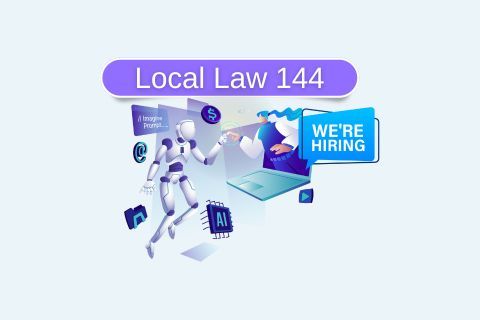How Local Law 144 Protects Job Seekers and Employees
- Home
- Self-Check Blog
- Self-Check
- How Local Law 144 Protects Job Seekers and Employees

August 8, 2023
New York City started enforcing Local Law 144 on July 5, 2023. This law regulates automated employment decision tools, which should help anyone applying for jobs or promotions. As such, you should know what this law does and how it could help you.
What are Automated Employment Decision Tools?
Local Law 144 defines an Algorithmic Employment Decision Tool (AEDT) as a computer-based tool that uses advanced technology. Examples of this technology include machine learning, statistics, data analysis, and artificial intelligence. It helps employers and employment agencies make decisions about hiring and related matters. The tool is more than just a support system; it significantly assists in — or even — replaces manual decision-making.
The Law’s Requirements
The law has three primary requirements that employers must follow to comply. Employers must perform an annual bias audit on any AEDT they use, give notice to job applicants and employees concerning their use, and publish the results of the bias audit.
It bans employers and employment agencies from using AEDTs without confirming that the tools underwent bias audits. The employer must have the audit conducted by a third-party company. However, only companies certified by the New York City Department of Consumer and Worker Protection (DCWP) before conducting audits.
The employer must notify employees or job applicants ten days before the AEDT screens them. The employer must also provide information about the tool, including the job qualifications or characteristics it will assess. The notice must explain how an applicant or employee can obtain a reasonable accommodation under another law.
Finally, employers must also publish a summary of the most recent bias audit. This summary includes the AEDT’s distribution date, which indicates when the employer started using the tool. Other details include the source of the data used for the audit and an explanation of how the audit ensures fairness.
The summary should also include how many people the AEDT classified under the unknown category. It should provide the number of applicants or candidates, their selection or scoring rates as applicable, and the impact ratios for all categories. Employers must comply with these requirements to ensure transparency and accountability.
Penalties for Non-compliance
Employers who fail to comply could receive fines of up to $25,000 per violation. In addition, the law may require the employer to take corrective action, such as training their employees or stopping all use of the AEDT. However, the law does not require extra steps for employers based on the bias audit’s results.
The DCWP recently issued an FAQ to clarify Local Law 144’s requirements. For example, it reiterated that employers must comply with all anti-discrimination laws. As such, the bias audits would ensure they take action to ensure compliance when needed.
The Benefits for Employees and Job Applicants
This new law protects job seekers and employees from discrimination by AI hiring tools and ensures transparency in hiring. As such, job seekers can expect a fair chance at employment. However, you should be mindful of factors like background checks that can impact hiring and promotions. To increase your chances of employment, consider running a self-background check to correct any errors in your background information. This step could help present an accurate profile to potential employers.
Background checks don’t have to be complicated. Try running a self background check today and give yourself a head start.
